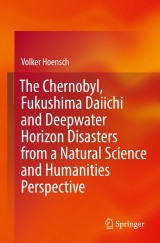Details

The Chernobyl, Fukushima Daiichi and Deepwater Horizon Disasters from a Natural Science and Humanities Perspective
|
80,24 € |
|
| Verlag: | Springer |
| Format: | |
| Veröffentl.: | 01.07.2022 |
| ISBN/EAN: | 9783662653197 |
| Sprache: | englisch |
| Anzahl Seiten: | 187 |
Dieses eBook enthält ein Wasserzeichen.
Beschreibungen
<p>In our everyday imaginations we use the laws of nature with their tremendous possibilities of technical progress for the benefit of mankind.</p>
<p>The three catastrophes of Chernobyl (26 April 1986), Fukushima Daichii (11 March 2011) and in the Gulf of Mexico, explosion of the drilling platform Deepwater Horizon (20 April 2010), have shaken this world view.</p>
<p>Who directed this development? Is it a matter of human error or technical failure?</p>
<p>For the answer, approaches from the natural sciences and the humanities are presented.</p>
<p>The three catastrophes of Chernobyl (26 April 1986), Fukushima Daichii (11 March 2011) and in the Gulf of Mexico, explosion of the drilling platform Deepwater Horizon (20 April 2010), have shaken this world view.</p>
<p>Who directed this development? Is it a matter of human error or technical failure?</p>
<p>For the answer, approaches from the natural sciences and the humanities are presented.</p>
<p> Preface.- . 1 Four selected accident events.- 2 Cause-effect structure and intentional structure.- 3 Space-time structure.- 4 Evaluation and outlook.</p><br><p></p>
<p> Volker Hoensch studied mechanical engineering at the University of Stuttgart, majoring in nuclear energetics and thermal fluid machinery. In his professional career, he has been particularly concerned with human reliability issues. He has made many contributions in this field, especially to the International Atomic Energy Agency at the United Nations (UN).</p>
<p>After the nuclear disaster of Chernobyl in 1986, the author worked exclusively internationally. After working for several years at the World Association of Nuclear Operators, Paris Centre, the European Union appointed him project manager for the safety of nuclear power plants in the Ukraine. In February 2006, he received his doctorate from the Technical University of Munich on the experience gained in the performance behaviour of nuclear power plants.</p>
<p>He is a member of the working group "Human Reliability" at the Association of German Engineers.</p><p></p>
<p>After the nuclear disaster of Chernobyl in 1986, the author worked exclusively internationally. After working for several years at the World Association of Nuclear Operators, Paris Centre, the European Union appointed him project manager for the safety of nuclear power plants in the Ukraine. In February 2006, he received his doctorate from the Technical University of Munich on the experience gained in the performance behaviour of nuclear power plants.</p>
<p>He is a member of the working group "Human Reliability" at the Association of German Engineers.</p><p></p>
<p>In our everyday conceptions we use the laws of nature with their enormous possibilities of technical progress for the benefit of mankind. The catastrophes of Chernobyl (1986), Fukushima Daichii (2011) and in the Gulf of Mexico, explosion of the drilling platform Deepwater Horizon (2010), have shaken this world's view. Is it a matter of human or technical failure? </p><p>Humans strives to fulfill their intentions through purposeful action. How this usually happens can be explained by the example of the archer. He uses the cause-effect structure to achieve his goal to hit "into the bull's eye". The cause-effect structure for his action forms the causal chain, with the "Point of no Return" being extremely important for the action. This model from a scientific view can be compared the view from the humanities side as an crossing of the Rubicon river. This comparison leads to the questions: who is directing the human actions? Who is the scriptwriter on the stage of time and space? </p><div>To answer these questions, the above-mentioned catastrophes are analyzed. The answer is found in the concordance of natural laws with the decisions of the acting people. In order to achieve this alignment, safety culture is presented as an organizing tool for organizations that use technically highly complex facilities for their purposes. <p></p></div><p>The author </p><p>Dr. -Ing. Volker Hoensch studied mechanical engineering at the University of Stuttgart, majoring in nuclear energetics and thermal fluid machinery. In his professional career, he has been particularly involved in human reliability issues. He has made many contributions in this field, especially to the International Atomic Energy Agency at the United Nations. </p><div>After the Chernobyl nuclear disaster, the author worked exclusively internationally. After working for several years at the World Association of Nuclear Operators, Paris Centre, the EU appointed him project manager for the safety of nuclear power plants in the Ukraine. In 2006, he received his doctorate from the Technical University of Munich on the experience he gained in the performance behaviour of nuclear power plants. He is a member of the "Human Reliability" working group at the VDI. <br>Dr.-Ing. Volker Hoensch is one of the internationally relevant safety experts in the nuclear industry.<br></div><div><br></div><div>This book is a translation of an original German edition. The translation was done with the help of artificial intelligence (machine translation by the service DeepL.com).<p></p></div><p><br></p>
Demonstrates the importance of holistic safety considerations Clarifies Fukushima Daichii and Deepwater Horizon were human or technical failures Unique reappraisal of the processes from a natural science and humanities perspective

















